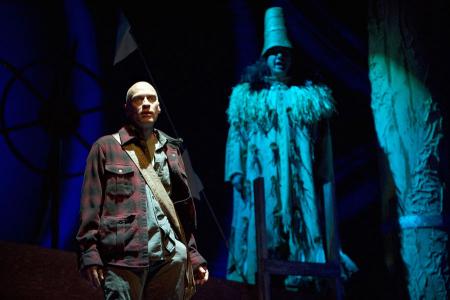Beyond Eden:

Is musical theatre known for its subtleties? I guess not. And this is why Beyond Eden — despite its tender treatment of challenging themes — wears its many rich metaphors on its sleeve. Everything is on the surface: beautiful but obvious.
The characters’ motivation, doubt and anguish are laid totally bare in song, which was a nagging distraction because it shouldn’t be this simple. It shouldn’t be so easy to reduce themes like cultural propriety, identity and imperialism to easy tropes and pretty lyrics. The ideas at play are contentious, not archetypal like some of the characters. But Beyond Eden was a pleasure to take in and a creative triumph in many respects. If this means more of us might think about colonialism in this province — I’m more than cool with it.
A Cultural Olympiad event and a joint production between the Vancouver Playhouse Theatre and Theatre Calgary, Beyond Eden is a historical (and rock) musical three decades in the making that breathes imagination and beauty into larger-than-life (and real-life) British Columbian legends. Based on a 1957 archaeological expedition to Haida Gwaii to extract totem poles from a remote and vacated community, Beyond Eden was conceptualized and written by Bruce Ruddell who composed the score with Bill Henderson of Chilliwack fame. Dennis Garnhum directs this production that draws on Haida society, spirituality and art. Haida artist Gwaai Edenshaw contributed to the overall esthetic, and the score includes Haida songs performed by First Nation singers and drummers.
Lewis Wilson (John Mann) is the fictionalization of Wilson Duff, an anthropologist and curator who led the voyage to unearth poles that served as memorial and gravesite markers, transporting them south to UBC’s Museum of Anthropology where they remain today. Played by Mann, formerly of folk band Spirit of the West, we feel the passionate obsession of Wilson/Duff. His profound admiration for Haida culture drove him to penetrate its meanings and icons — even if they were not his to know or to “salvage.”
Complicating the question of cultural entitlement is Max Thomson (Cameron MacDuffee), a photographer of Haida and British decent who embraces the art of carving when he senses the craft can forge a connection with his indigenous ancestry. Thomson is a fictionalized representation of Bill Reid, the influential artist who helped bring Haida carving to international renown and who followed Duff on the ’57 voyage as a CBC reporter. Reid became a good friend of Ruddell, which understandably places this story close to the composer’s heart.
Anthropologists like Duff debated the relevance of artifacts and if one simple, tactile thing can represent a complex and dynamic society. Beyond Eden prods the dilemma of cultural ownership and veneration, asking if knowledge is also a privilege. And, if so, whose?
This dilemma takes shape on stage as a pair of masks gifted to Wilson/Duff from the Watchman (Tom Jackson), a supernatural trickster figure who protects the sacred site and leverages morality to impressive but ineffective ends. Wilson looks only outward in his quest to understand, not at his own motivation and the toll his work may take on Haida memory and his own family. He holds a mask and begs to know its secrets: “How did you live? How did you die? What hides behind your eyes?”
No one can miss the point of one mask with closed eyes and the other with eyes open. Should anyone blank on the meaning, the masks are conveniently named Appetite and Insight.
Despite this, these twin masks and all props, costuming and design, contribute to the remarkable execution of Ruddell’s artistic vision. Beyond Eden is elaborately staged on a set well deserving of the creativity. The theatrical treatment of the totem poles is reason enough to see the show twice.
Moving beyond the lack of symbolic subtlety, Beyond Eden puts music to a narrative and an ethical quandary more British Columbians should be familiar with.
For more information, voyage here.



